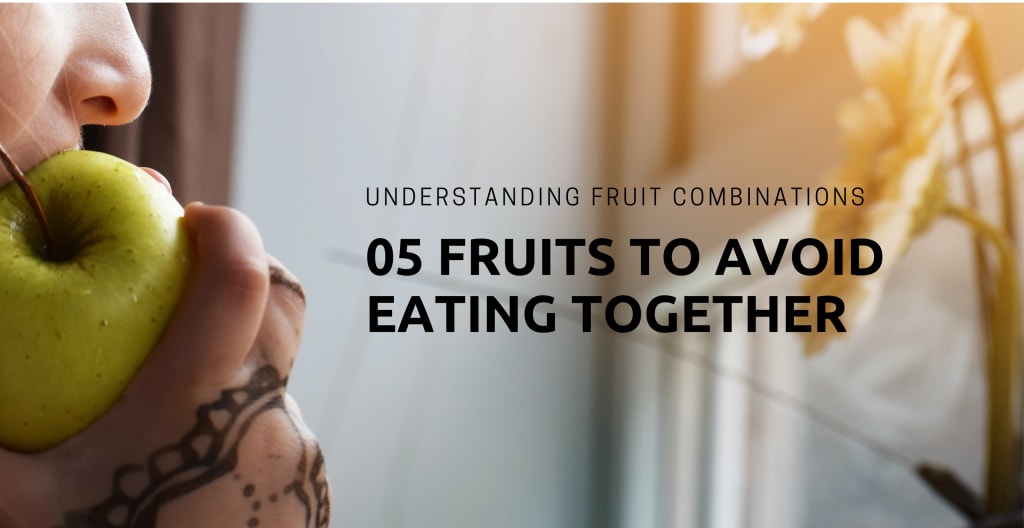
Fruits are nature's delightful gifts, packed with vitamins, minerals, and antioxidants that nourish our bodies. They are not only delicious but also highly nutritious. However, did you know that combining certain fruits can affect digestion and overall health? In this article, we will explore the art of food combining, specifically focusing on which fruits should not be eaten together to maximize their benefits and avoid potential digestive issues.
Understanding Food Combining
Food combining is a dietary approach that suggests certain foods should not be consumed together because of their differing digestion times or chemical compositions. Proper food combination aims to enhance digestion, nutrient absorption, and overall well-being.
When it comes to fruits, some combinations can be particularly problematic and lead to digestive discomfort and other health issues. Let's delve into some fruit combinations to avoid.
Why Avoid Certain Fruit Combinations?
Digestive Issues
The primary reason to avoid incompatible fruit combinations is to prevent digestive discomfort. When fruits are not digested properly, they can ferment in the gut, leading to gas, bloating, and indigestion.
Fermentation and Gas
When fruits with different digestion times are mixed, the slower-digesting fruits can ferment in the stomach and produce gas. This can cause discomfort and disrupt the digestive process.
Nutrient Absorption
Certain fruit combinations may interfere with nutrient absorption. For instance, calcium in milk can bind to oxalic acid in certain fruits, reducing the body's ability to absorb calcium effectively.
Fruits That Should Not Be Eaten Together
1. Citrus Fruits and Milk
One common mistake people make is combining citrus fruits like oranges, grapefruits, or lemons with milk or milk-based products. The high acidity of citrus fruits can curdle the milk proteins, making them difficult to digest and potentially leading to stomach discomfort.
2. Bananas and Milk
Bananas are a popular and nutritious fruit. However, combining them with milk may create a heavy and slow-to-digest mixture in the stomach. Some believe this combination can lead to the formation of toxins, causing digestive problems and a feeling of sluggishness.
3. Melons and Other Fruits
Melons have a high water content and digest very quickly compared to other fruits. Eating melons with other fruits that have a slower digestion time can lead to fermentation in the gut and cause bloating or gas. It's best to consume melons separately, at least 30 minutes before other fruits.
4. Acidic Fruits and Starches
Combining acidic fruits like berries or pineapples with starchy foods such as bread or potatoes can hinder the digestion of both. The enzymes required for breaking down acidic fruits and starches are different, and consuming them together may lead to inefficient digestion.
5. Apples and Oranges
While both apples and oranges are popular and nutritious fruits, combining them in the same meal may not be ideal. Apples are rich in fructose, while oranges contain high levels of citric acid. The clash of these components can lead to indigestion and discomfort for some individuals. To fully enjoy the benefits of each fruit, it's best to savor them separately.
How to Optimize Fruit Consumption
While it's essential to be mindful of fruit combinations, it's equally important to enjoy their health benefits. Here are some tips to optimize your fruit consumption:
Eat Fruits Alone: To avoid any potential issues, try to consume fruits separately from other food groups.
Combine Compatible Fruits: Instead of mixing multiple fruits, opt for combinations that work well together, such as berries with peaches or apples with pears.
Wait Between Meals: If you've consumed fruits, especially melons, it's best to wait for some time before eating other foods to allow proper digestion.
Conclusion
Fruits are a vital part of a balanced diet, offering an array of nutrients and health benefits. To enjoy them to the fullest, it's crucial to be mindful of how we combine them. By understanding which fruits should not be eaten together, we can enhance our digestion, prevent discomfort, and make the most of these natural treasures.
About the Creator
arju
Passionate writer and reader exploring the realms of personal development, health, and fitness. Sharing insights and inspiration to uplift and empower. LOVE YOURSELF






Comments
There are no comments for this story
Be the first to respond and start the conversation.